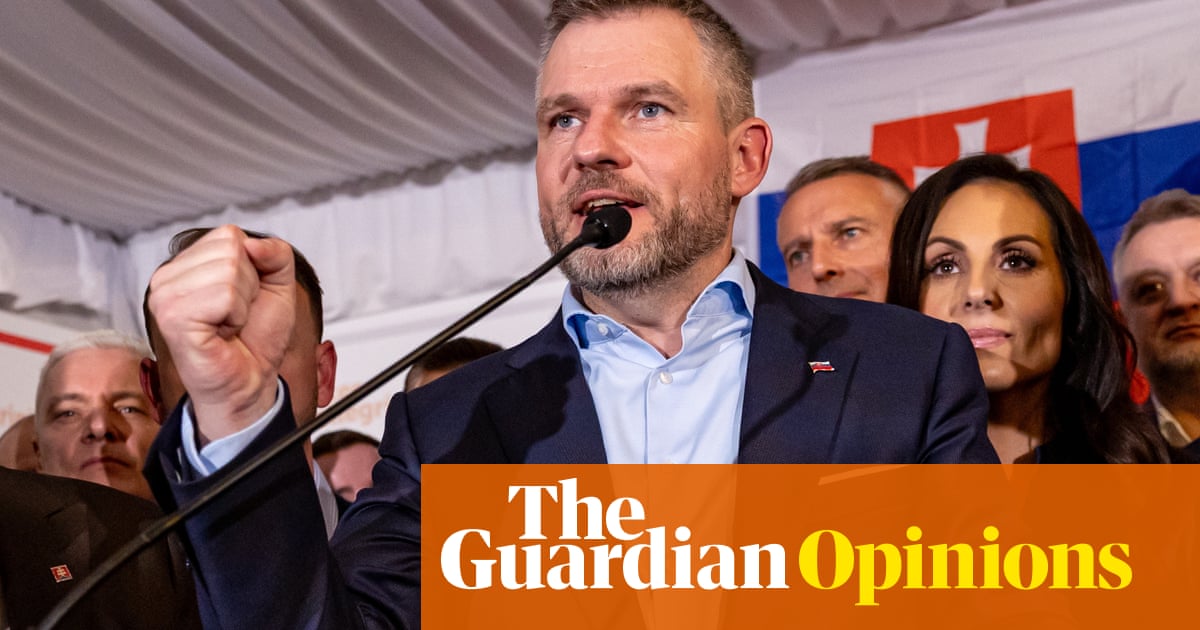
The victory for Peter Pellegrini in Slovakia’s presidential election is just the latest triumph for the far right in Europe. Even though the role of president is largely symbolic, his win over his pro-European rival, Ivan Korčok, by a comfortable six-point margin, consolidates the power of the prime minister, Robert Fico. The result is one of a growing number of victories for politicians supportive of Vladimir Putin in Europe.
Public support for the far right is sweeping across the continent. In the Netherlands and Portugal, far-right parties have also increased their vote share in recent national elections. Meanwhile, polling ahead of German local elections, and Austrian and Belgian parliamentary elections this year, suggests they are likely to make gains in these countries too. There is a real possibility that Austria’s elections might see a return to power for the far right, Putin-supporting Freedom party, if another party can be convinced to join it in a coalition. There is a sense across Europe that the far right is gathering momentum and expanding beyond its usual core vote.
This trend is mirrored in the European parliament, where polls suggest the two far-right groupings are likely to increase their vote share in elections in June. Russia is the issue where the difference between the two groupings is at its most stark. The far-right European Conservatives and Reformists (ECR) group, home to Italy’s prime minister Giorgia Meloni’s party, is broadly supportive of sanctions against Russia and aid to Ukraine. While the far-right Identity and Democracy (ID) group, which includes Germany’s Alternative für Deutschland and Austria’s Freedom party, is pro-Russian and has systematically voted against support for Ukraine. Both are forecast to increase their seats, the latter grouping by more than a third, potentially placing it behind only the conservative Europe People’s party (EPP) and the leftwing Socialists and Democrats. This means not just an increase in vote share for the far right, but for a pro-Putin far right.
Alongside the usual electoral campaigning, there have also been some attempts at horse-trading in the hope of re-orienting the coalitions. The current European commission president, Ursula von der Leyen – affiliated with the EPP – has been courting Meloni, amid speculation her Brothers of Italy party is considering leaving the ECR and joining the EPP to bolster its overall vote share. Meanwhile, Viktor Orbán’s Fidesz doesn’t currently have a home in the European parliament after leaving the EPP before it could be ousted in 2021, but has stated his intention for the party to join the ECR.
Why is this important? With key challenges such as military support for Ukraine, EU enlargement and the green transition on the agenda in the next parliament, a growing far-right bloc sympathetic to Putin will be sure to have its say. Ukraine is an especially pertinent issue: there will inevitably be crunch discussions about further financial, military and humanitarian aid, and the extent to which EU countries will be willing to support Ukraine by reducing trade barriers on the import of goods. While von der Leyen has made it clear that defence and security are her top priorities if re-elected for a second term, increased pro-Putin leanings in both the European parliament and in the European council could make this more difficult.
Hungary – who will also hold the six-month rotating seat of the council presidency from 1 July 2024 – has already demonstrated it can hold up aid for Ukraine and block new sanction packages proposed by the commission. Orbán, Putin’s puppet in Europe, has also tried to advance Serbia’s accession to the EU – a state with an equally pro-Russian government – at a faster pace than other Western Balkan states that are technically speaking more ready for accession.
The far right across Europe – whether pro- or anti-Putin – agrees on one thing, and that is the need to consolidate its position to hollow out the EU from within. Yet seeking closer relations with Russia, as some parties are keen to do, brings with it all kinds of security risks. The recent allegations against Austrian intelligence officials expose the extensive spy network the Russian state has built up in Europe to further its own imperialist agenda. Consider a scenario in which Russia does challenge the territorial integrity of an EU – or Nato – state. What might a European response, where pro-Putin parties have influence, look like?
The growth in support and influence for the Putin-supporting far right across Europe, of which Slovakia is the latest country to fall victim, is a grave security risk to the continent. This coalition – which includes the Austrian Freedom party and Marine Le Pen’s National Rally in France – do not view Russia as the acute security risk it is, and are reluctant to support much-needed coordination with Nato on security and defence policy. In the short to medium term, this will leave the EU unable to coordinate essential support for Ukraine – a tragedy for the Ukrainian people. But also in the long term, it will leave European countries vulnerable to foreign hostile interference in all aspects of life – ultimately fundamentally undermining the principles of democracy.